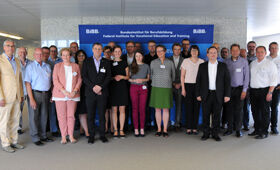“Thinking Space” – the future of training in industry
BIBB workshop pilots new communication format for networking between academic research and practice
Ongoing digitalisation is bringing about dynamic change in the world of work. Teaching and learning methods are being transformed in the wake of greater mobility. All of this is creating new challenges for dual vocational education and training at industrial companies. What will dual VET look like in this sector in ten years’ time? How will the “New Work” trend be reflected? Which requirements will emerge with regard to training and learning culture?

In order to examine issues of this nature in greater detail, the Federal Institute for Vocational Education and Training (BIBB) has introduced a new communication format entitled “Thinking Space”. An initial event has now been held with the involvement of heads of training from industry, academic research stakeholders and experts from BIBB. Selected creative methods were deployed with the objectives of examining the topic of “the future of training in industry” from a range of different perspectives, of networking on the experiences gained by innovative companies, and of discussing the primary directions of travel to be adopted. The workshop was attended by around 40 specially chosen participants from several industrial sectors. Large and medium-sized companies, enterprises included on the DAX Index and family-managed firms were all represented.
The preliminary outcomes arrived at were as follows:
- Trainees need to be appreciated in the same way as customers. A multiple shifting of perspectives proved to be a helpful approach within the workshop. Use of the “blind storming” method, for example, enabled various trainee stories to be related. The subsequent discussion investigated the issue of what training wishes trainees would have in 2028. In the view of the participants, it will be necessary to gain a keener awareness than has previously been the case of the life reality of trainees. Committed marketing will also be required.
- The trainer needs to act as a coach. Those attending the event agreed that the role played by training staff will increasingly move away from the function of a practical instructor as trainers develop into learning process support agents, mentors and coaches. There is also a perception that vocational school teachers will adopt this part to a greater extent. The focus in future will need to be on imparting motivation, on initiating learning processes and on teaching the sort of expertise that is necessary in order to tap into information and open up new communication pathways.
- Training needs to be thought about in terms of its end product. This means taking a conscious approach towards shaping individual career pathways and opportunities for specialisation within vocational education and training in order to enable trainees to progress to the status of highly-qualified skilled workers or experts via the foundation of solid basic training.
- Cooperation between learning venues and learning outcomes are two further issues. In the opinion of those taking part in the event, digitalisation, chances for networking and the use of artificial intelligence within the structure of training could bring about a significant change in harmonisation between learning venues and in the way in which learning outcomes are documented and thus support individualised learning pathways.
- The unanimous view is that vocational education and training in the year 2028 will need to generate a joint sense of awareness and “create an identity”. “Individual, social and digital” aspects are seen as further attributes in this regard. Participants worked in groups to develop possible project ideas for implementation, and these could also exert an impact at the system level.
BIBB President Friedrich Huber Esser summed up by saying that the new workshop format could prove itself to be a worthwhile instrument for enriching dialogue between academic research, policy making and practice because it contained an enormous amount of inherent potential in terms of creativity, transfer and communication.
The ideas and proposals developed in conjunction with the companies and the academic research community during the workshop will be used to inform BIBB’s work in future.